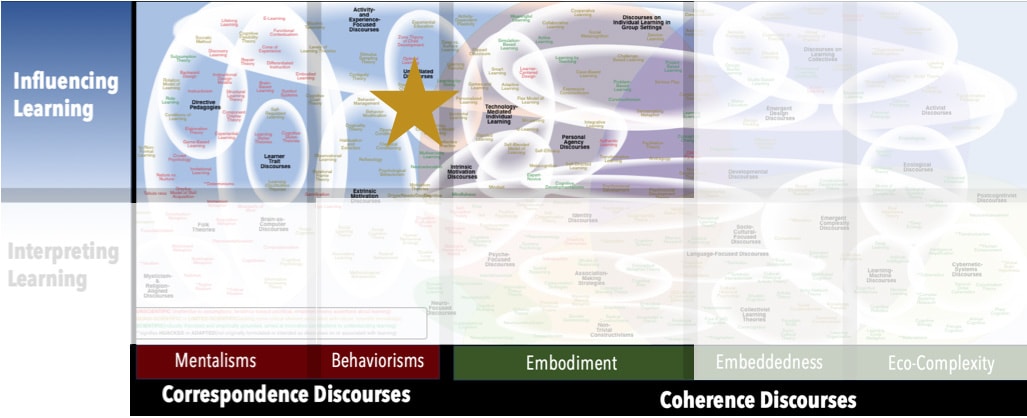AKA
Nonintentional Learning
Focus
Learnings that are by-products of other activitiesPrincipal Metaphors
Incidental Learning is not explicit on the nature or dynamics of learning. To our analysis, explications of the perspective tend to make heavy use of the Acquisition Metaphor. Close reading, however, suggests that intended meanings are more toward Non-Trivial Constructivisms:- Knowledge is … sum of already-established construals/constructions
- Knowing is … personal sense derived from individual experience
- Learner is … a meaning-maker (individual)
- Learning is … construing or construction
- Teaching is … supporting sense-making
Originated
1940sSynopsis
Incidental Learning refers to learning that is a “by-product” of some other activity – that is, to learning that occurs without specific motivation or focused instruction. It is often distinguished from both Implicit Learning (see below) and Informal Learning, while being associated with Non-Formal Learning (see In-/Non-Formal Learning). Implicit learning occurs when one is not consciously aware; Incidental Learning may or may not be implicit. Informal Learning is usually intentional; Incidental Learning is typically spontaneous and unstructured. The notion was developed in acknowledgment of the great deal learned by all humans without explicit intention or instruction. Associated discourses include:- Implicit Learning – learning that happens without awareness or intention. Subtypes include:
- Implicit Sequence Learning (Mary Jo Nissen, Peter Bullemer, 1980s) – becoming sensitive and attuned to patterns in the environment (e.g., patterns of speech, implicit rules of behavior) without intention or awareness
- Intentional Learning – learning that is deliberate and, typically, planned
- Learning without Awareness – a controversial construct involving a change to one’s behavior with no awareness of the conditions that contributed to that change
- Subliminal Learning – a subcategory of Implicit Learning (see above) that, typically, is deliberately engineered by presenting stimuli below the threshold for conscious awareness
- Unconscious Learning – roughly synonymous with Implicit Learning (see above) but more strongly associated with Psychoanalytic Theories, Unconscious Learning describes learning that happens without awareness or intention, and that often serves as a focus of analysis to better understand personal pathologies
Commentary
At first blush, it would appear that Incidental Learning is merely a formalization of the Immersion Metaphor, and so not an especially useful notion within education – at least not a version of formal education that is defined by pre-stated objectives and standardized assessments. Growing interest in the matter might be taken as a reflection of an elaborated view of education, one that is attentive to the Incidental Learning of language, social competencies, habits, and other self-defining knowings.Authors and/or Prominent Influences
J.A. McGeoughStatus as a Theory of Learning
Incidental Learning is not a theory of learning. It signals a category of learnings, but it does not attempt to offer new insight into complex dynamics of learning.Status as a Theory of Teaching
Incidental Learning is not a theory of deliberate teaching, but it is a perspective that highlights the narrowness of traditional conceptions of teaching and education.Status as a Scientific Theory
There is ample evidence to demonstrate not just the existence of Incidental Learning, but to a broad underappreciation of its significance to one’s knowing. That said, Incidental Learning is not explicit about its metaphors or its assumptions around the complex dynamics of learning.Subdiscourses:
- Implicit Learning
- Implicit Sequence Learning
- Intentional Learning
- Learning without Awareness
- Subliminal Learning
- Unconscious Learning
Map Location

Please cite this article as:
Davis, B., & Francis, K. (2024). “Incidental Learning” in Discourses on Learning in Education. https://learningdiscourses.com.
⇦ Back to Map
⇦ Back to List
